If you’re new to ducks and this is your first winter, don’t worry! Keeping them warm and well-fed is actually super easy. Our ducks are champs in cold weather, even more so than our chickens.
Ducks are pretty easy to take care of, and once you’ve covered the basics, you’ll be all set for the winter and ready to embrace spring.
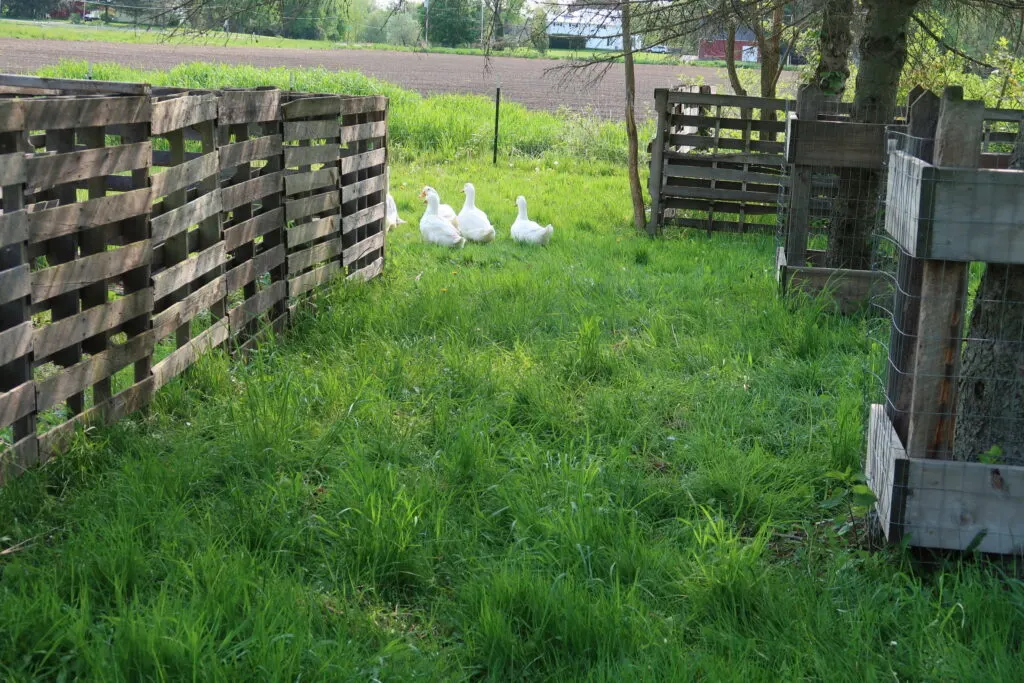
How Do Ducks Stay Warm In Winter?
Unlike humans, ducks have an incredible natural ability to regulate their body temperature. These cold-blooded creatures rely on their waterproof feathers to insulate them from the chilly air and puff themselves up to create an extra layer of warmth.
Their specialized circulatory system also prevents their feet and legs from freezing. In addition, ducks generate heat by digesting food, so it’s essential to ensure they’re getting enough.
Offering your ducks a warm place to sleep out of the extreme cold is crucial.

Housing Needs For Ducks in Winter – Preparing The Coop.
Now that you know how ducks stay warm, let’s talk about the kind of housing they need during winter. First and foremost, you’ll want to ensure their coop is large enough to accommodate them comfortably.
Ducks produce a lot of moisture, so choosing a coop with proper ventilation is essential to prevent condensation buildup. While it’s tempting to seal up all the cracks to keep out the cold, keeping things well-ventilated is essential.
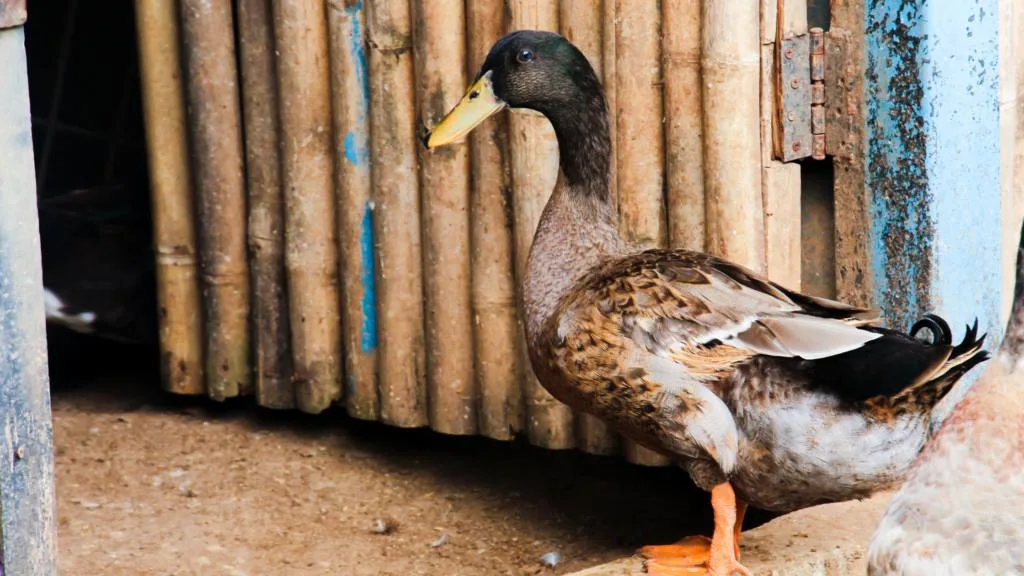
Provide Deep Litter On The Floor
One way to keep your ducks cozy is by providing deep litter on the floor of their coop. You want a nice dense layer of natural materials like straw, leaves, or wood shavings to create warmth through natural decomposition.
It also adds a little help to absorb any moisture and odor, keeping the coop fresh and clean. We also remove the top layer before adding a fresh layer during the harsh winter months.

What to use for deep litter?
You can use various materials for deep litter, but straw is the best and most common option. It is easily available, affordable, and does not become moldy quickly.
But remember, you need dry bedding for the floor of their coop and nesting area. Use a similarly deep layer in their nesting boxes to keep them comfortable.
We put an extra straw down in the corner of the coop for the ducks. We also have straw in our chicken nesting boxes.
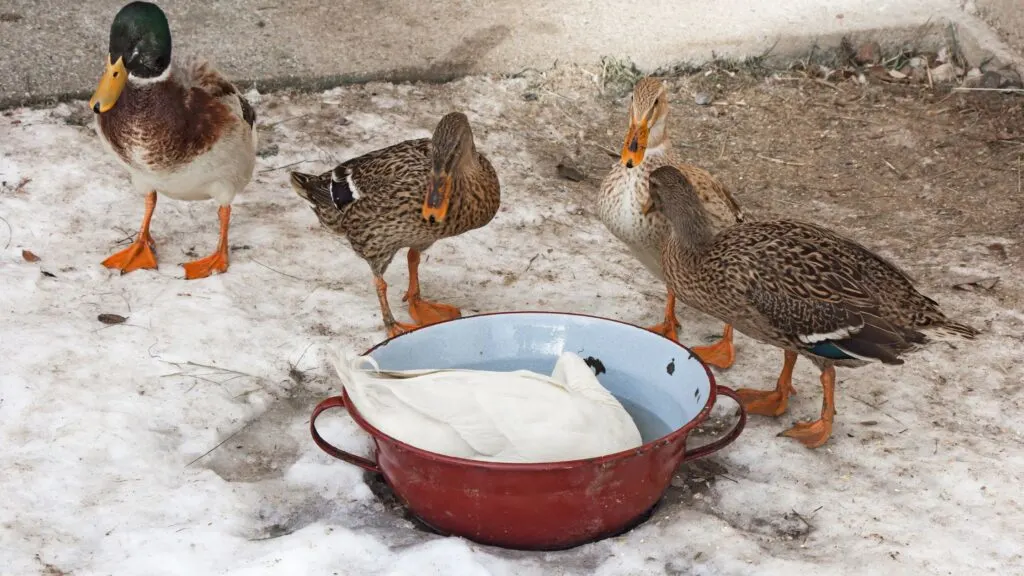
Do you need to heat the coop in the winter?
Unless it is unbearable cold, you do not need to heat the coop in winter. Ducks do just fine in cold temperatures; too much heat can harm them.
They can also get in accidents since the cords could fall into the coop and partitions. A heated water container may be a better option for cold winters.
One of my pet peeves in the winter is breaking ice for the animals. I try to use heated bowls for livestock. For our pigs, we use a heated dog bowl and I’ve seen chickens and ducks making their way over to the pig pen and drinking from it. As long as you offer water that isn’t frozen they will find a way to get to it.
Ducks vs Chickens In The Winter
When it comes to winter care, ducks and chickens have different needs. While chickens can tolerate colder temperatures than ducks, they are more susceptible to frostbite and respiratory issues.
Did you know that even when ducks are completely wet, they stay warm? It’s true! Both wild and domestic ducks have a fantastic defense system against the cold.
They have a double layer of waterproof feathers to keep them dry; underneath that, they have a cozy layer of warm down. They also have a thick layer of fat to maintain their body temperature at a toasty 106°F to 108°F.
Unlike chickens, ducks don’t have wattles and combs that can get frostbite. The only part of their body that’s exposed is their feet. But don’t worry, they’re well-prepared to handle the cold even in those vulnerable areas.
Keeping their coop dry and draft-free is essential and provides plenty of roosting space.
Chickens will roost up on their roosting bars or branches, whatever you have provided in the chicken coop. When they do this they are sitting on their feet. Keep in mind the cold ground of your winter duck house. The deep litter method is excellent for ducks resting on frozen ground.
Water & Food
One of the most important things to remember when caring for ducks in the winter is that they still need fresh water. Ice on their existing water source can be a death trap for ducks as they can’t break it alone.
If you can keep the food or water outside of the dry coop, it will help keep the coop cleaner. Our ducks stay with our chickens inside the chicken coop.
When they go to get water in the winter it splashes everywhere. If you can place the waterer outside in a sunny area, it will help minimize the mess.
Plus, it reduces the risk of fires if you use a heated waterer.
Tractor Supply now sells these convenient duck waterers that help minimize the water everywhere if you have chickens. In the summertime, we keep a small pool for water that the ducks will choose to drink from instead of the chicken waterer.
Why don’t Duck’s Feet and Legs Freeze?
You may have noticed that duck feet don’t freeze in the winter, and that’s because they have a heat-exchange system. The blood vessels in their legs and feet are adjacent, making it easier for warm blood to transfer to cold blood. This helps to keep their internal temperature consistent and ensures that their feet and legs don’t freeze!
But that doesn’t mean domestic ducks won’t freeze to the ground. Our Indian runner ducks, well, they aren’t the brightest. I’ve heard from others when temps get below freezing, they have gone into their duck pond and come out of it only to lay down and then freeze to the ground.
I don’t fill a pool of water for the ducks when it’s single-digit temps. They have their duck waterer that works just fine for those super cold days.
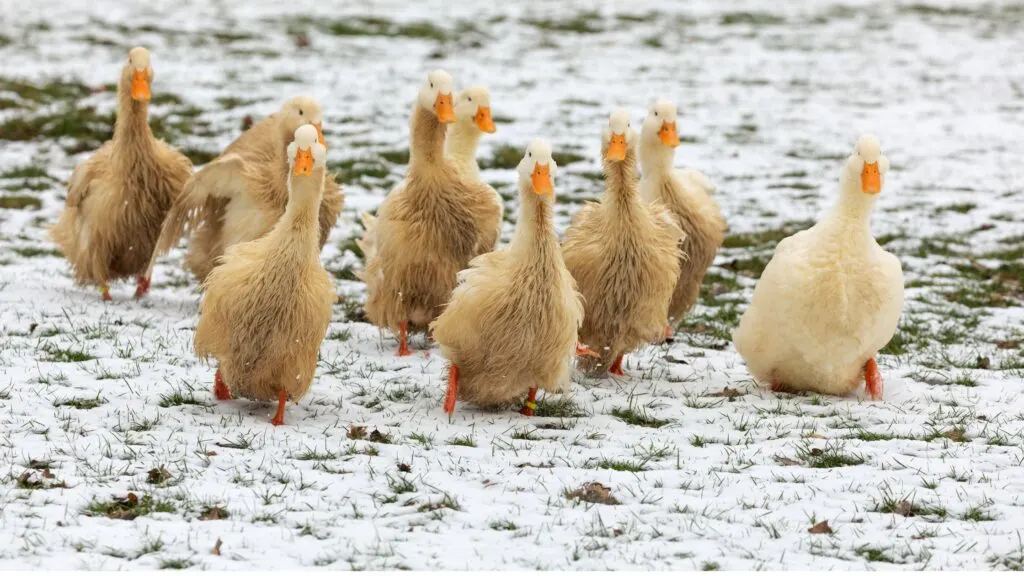
What temperature can a duck survive?
Ducks can survive in temperatures as low as 20 degrees Fahrenheit. However, be sure to watch for signs of hypothermia and frostbite.
Keep their coop around 32-40 degrees Fahrenheit, which may not seem warm enough to you, but it is just right for them. Monitor your duck’s behavior and add extra bedding if necessary. Different domestic ducks will be able to tolerate different temperatures. This is just a basic guideline.
Egg Production Might Decrease
During the winter, egg production typically decreases in ducks. Be sure not to make significant hasty changes thinking your ducks are unhealthy, but monitor their overall behavior. They might have specific needs by now, such as non-GMO grains, flaxseed, or kelp, that could help with egg production.
Provide Plenty of Treats and Greens
It’s important to remember to give your ducks plenty of treats and greens during the winter months. Higher protein helps keep ducks warm in winter. Consider adding some delicious high-calorie treats to keep your ducks happy this winter.
Check out these excellent options: scratch grains, sunflower seeds, peanuts, and mealworms.
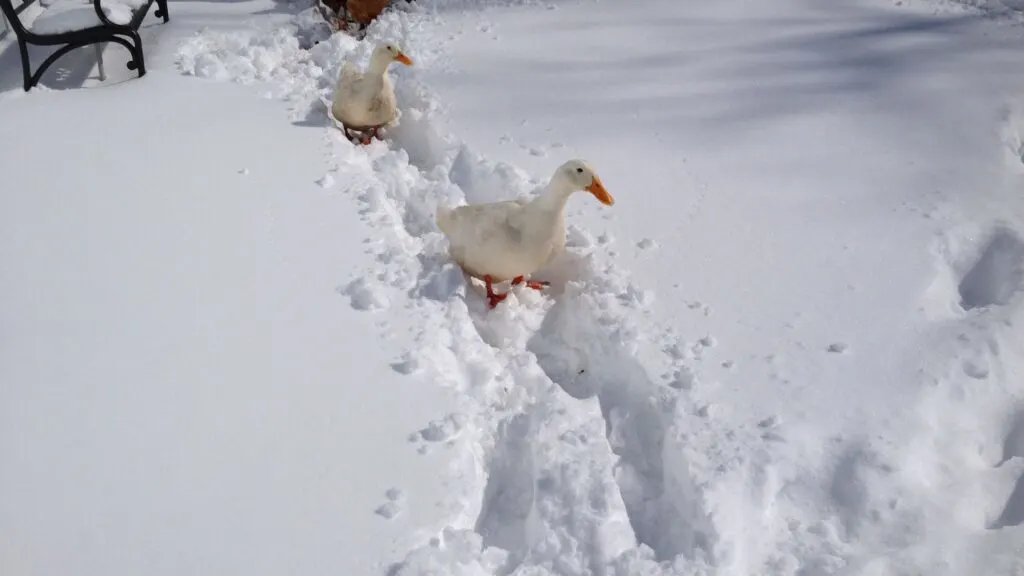
Watch Out For Ice
Clean the coop frequently so there isn’t a buildup of moisture that could become ice. Another tip is to reduce the amount of ice in their water. Crack and remove any ice from the top of the water sources frequently.
Preventing ice accumulation prevents your ducks from getting stuck and can also help regulate the temperature to avoid them getting hypothermia.
All our animals, the ducks, and chickens, love warm water in the winter. In the winter, I will shovel a path of snow from the coop door through the chicken and duck run. After raising a few different duck breeds, I’ve found that personality determines who will walk in the snow.
I like to shovel a path for them anyway if we have more than a few inches. Some ducks won’t step foot outside of the coop when there are a bunch of snow paths or not.
Then, when you have a warm winter day with the sun out, the paths melt down faster and you’ll see the ducks scratching away at the grass and frozen ground.
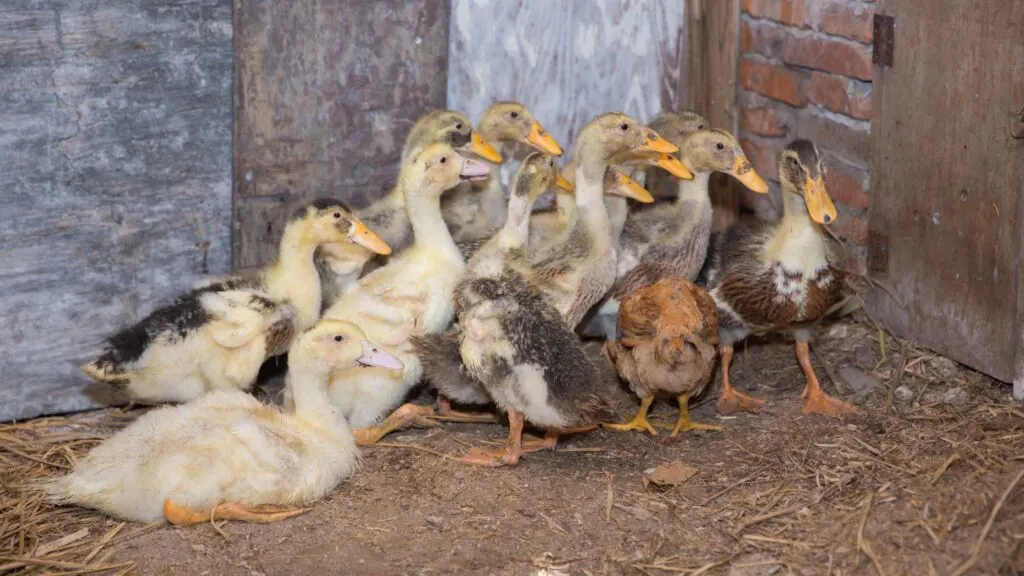
Add Extra Straw
An essential factor to consider during winter is to add an extra layer of straw on top of the deep litter base. A little bit extra can go a long way to help keep your ducks’ living areas as warm as possible.
This sweet may sound simple, but ensuring the ducks stay warm is also significant.
We use bales of straw to block drafts in our barn. You can also add bales of straw inside the coop for the ducks to peck at. Our chickens go crazy with this more than the ducks. It helps with boredom, too.
Wind Protection
You can also protect the duck shelter from the wind by keeping the roof secure to keep the duck shelter warm. These might seem like little things, but they can significantly impact your ducks’ well-being during the winter.
Avoid Heat Lamps
While providing heat lamps for ducks in winter might seem like a good idea in theory, it’s actually not necessary and can be really dangerous.
Not only do they take a lot of energy and could run your electricity bill through the roof, but they can increase the risk of a fire! Also, keeping the coop overly warm can cause your ducks to overheat.
If your ducks have full feathers they will be fine without a heat lamp.
Keep Things Well-Ventilated
Just as it is essential to provide ventilation in the summer, the same goes for the winter. To prevent the house from getting too moist and causing the growth or accumulation of mold, you will want to ensure that the coop is well-ventilated.
This allows the moisture to escape whilst also keeping the temperature regulated.
Take Advantage of Warm, Sunny Days
Whenever we get the occasional warmer day during winter, you must take advantage of it and give your ducks a chance to enjoy fresh air and sun.
This is an excellent chance for them to stretch their legs and change scenery.
In conclusion, caring for ducks in winter is all about keeping them dry, warm, and well-fed. Providing deep litter, ensuring ventilation, and shielding them from harsh winds and icy conditions are all crucial elements of winter care.
Monitor their water often, provide plenty of treats and protein, and take advantage of warm, sunny days to get them outside. With a little effort and attention, your ducks will thrive all winter. Quack on!
